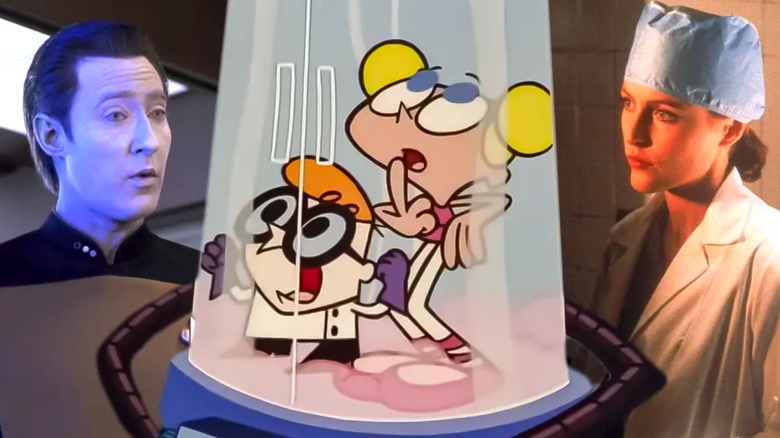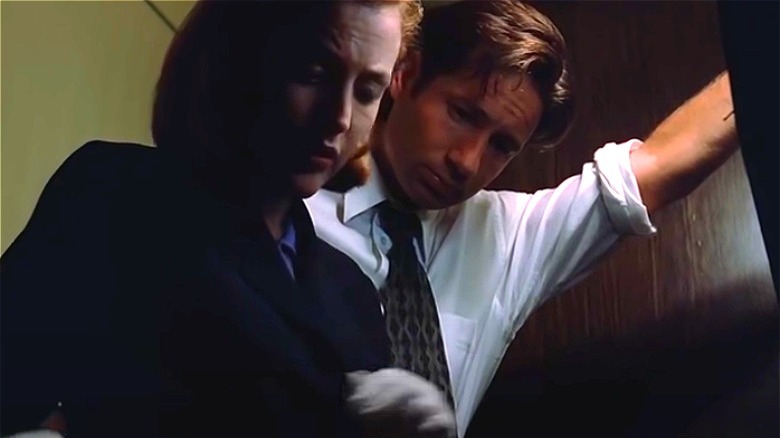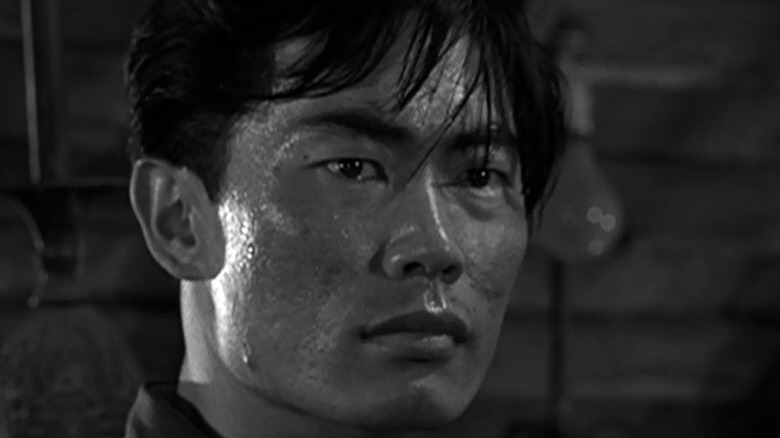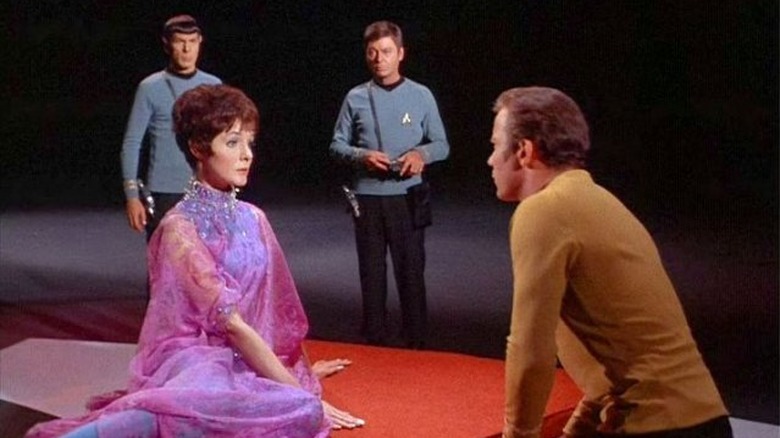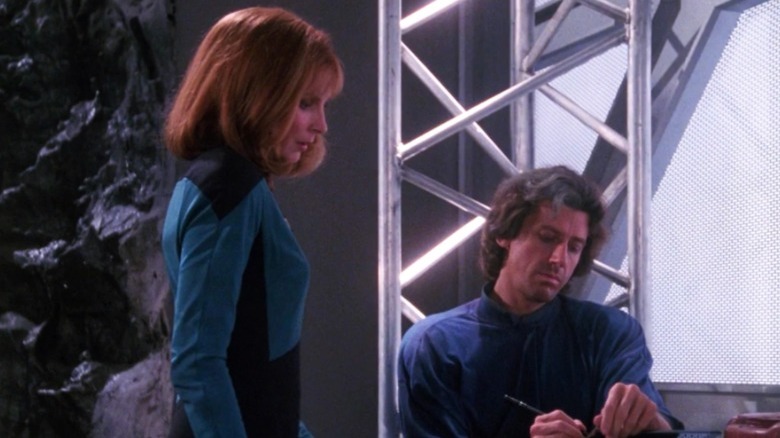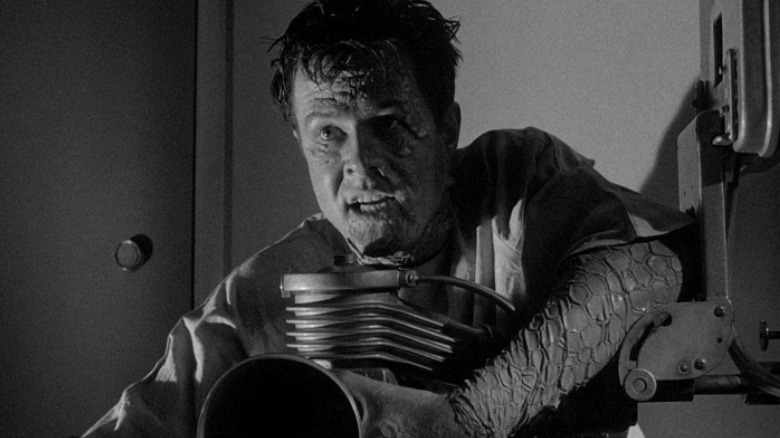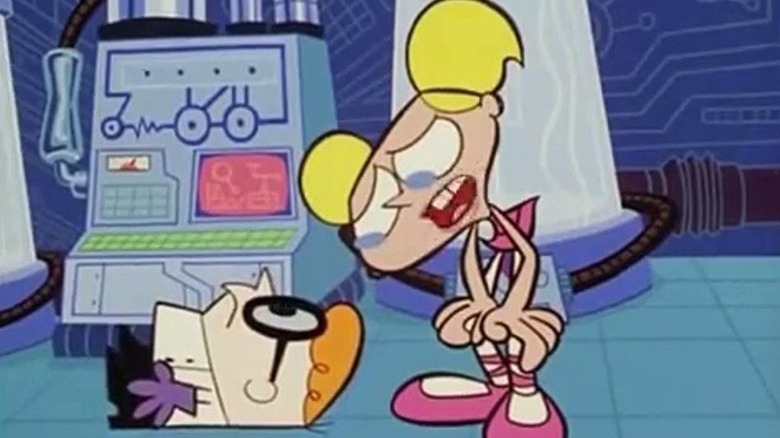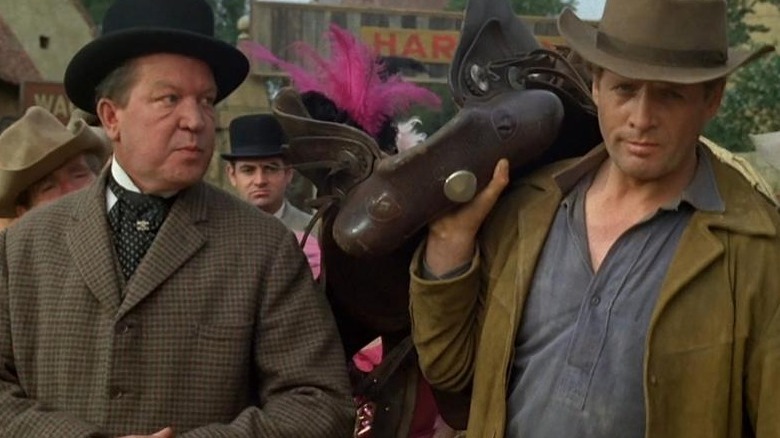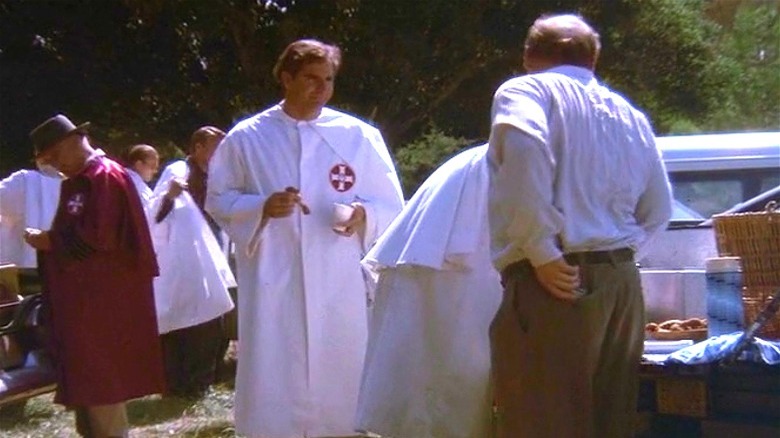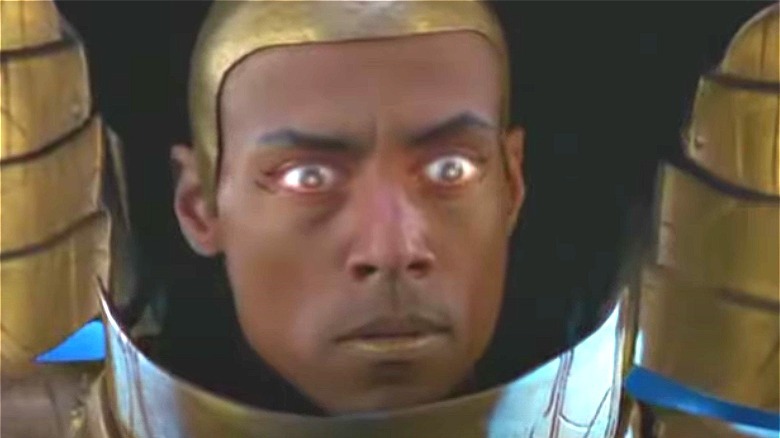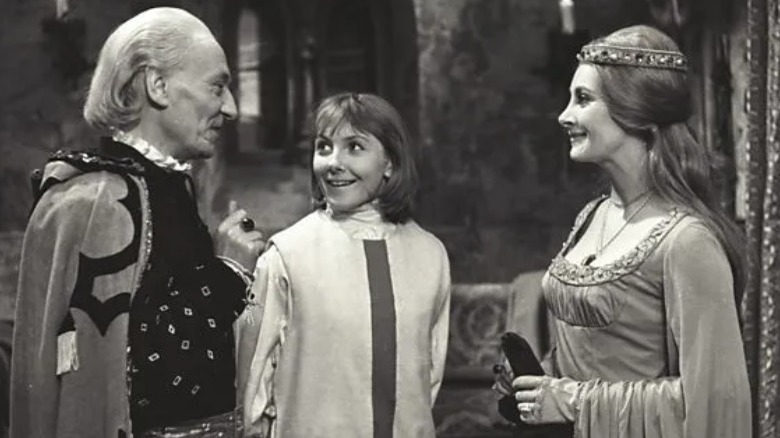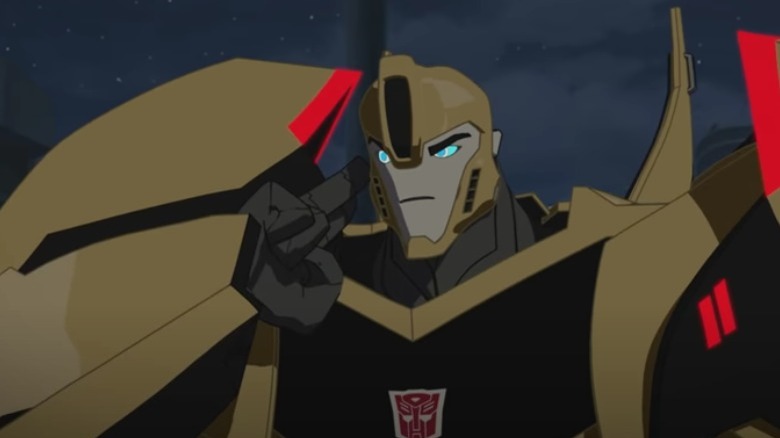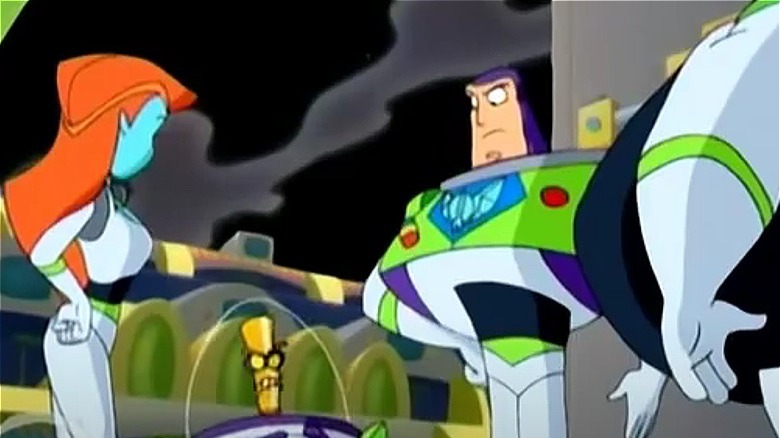Sci-Fi Episodes So Controversial They Were Banned
As far back as Mary Shelley's "Frankenstein," science fiction has served as a place to explore big, and often controversial, ideas. From dark, dystopian futures like "Black Mirror" and "The Matrix" to the parallel universes of shows like "Fringe," sci-fi inspires us to dream past the very limits of human possibility. By imagining a world that seems far apart from the one we live in either in space, time, or both, writers are able to ask questions and engage in discussions that challenge the status quo, criticize social norms, and imagine the unimaginable. And because these stories are often so removed from the mundane, they tend to get away with things that other genres often can't.
But in the world of television, not everything gets past the censors. From allegories that feel just a little too familiar to culturally sensitive content, let's set a course to explore the sci-fi episodes networks found too controversial to air.
The X-Files: Home
During its nine-season run, "The X-Files" served up tales of the paranormal ranging from dark to absurd to downright nightmare fuel. But for many viewers, the Season 4 episode "Home," which seems more suited to "American Horror Story," was just a bit too disturbing. Among the fandom, it's one of the most divisive episodes in the series, with content so graphic it warranted the show's only TV-MA rating and was semi-banned from Fox's syndication of the series.
The monster-of-the-week episode centers around FBI agents Scully and Mulder's investigation of the agoraphobic and murderous Peacock family of Home, Pennsylvania. As they get closer to the truth surrounding a deformed infant who was buried alive, the agents realize the family's dark secret — they are generationally inbred to the point of severe birth defects. To boot, they keep reproducing with the quadruple amputee mom they keep stored on a rolling cart under the bed. As far as dark content goes, it doesn't get much worse than this.
Although the episode was eerily set to the tune of "Wonderful! Wonderful!," it had to be covered since Johnny Mathis, who popularized the song with his version, wanted nothing to do with it. After the episode originally aired, Fox kept it out of rotation for three years, nixing the proposal for a sequel episode with Lance Henriksen but ultimately capitalizing on the self-ban for Halloween 1999 by advertising "an episode so controversial, it's been banned from television for three years."
Twilight Zone: The Encounter
Years before he would grow up to become famous for his portrayal of Hikaru Sulu on "Star Trek," the U.S.-born George Takei was forcibly detained with his parents during World War II as part of the United States' mass incarceration of Japanese Americans after Pearl Harbor. It's a personal history that makes his appearance in the highly controversial "Twilight Zone" episode "The Encounter" that much more poignant when viewed in the present day.
First airing in 1964, the episode finds a World War II vet named Fenton (Neville Brand) sharing a beer with his Japanese American neighbor and gardener, Arthur Takamori (Takei). As they're talking, Fenton pulls out the samurai sword he took as a war trophy. Soon, it begins to exert a supernatural influence on both of them, bringing out Fenton's enduring guilt and Arthur's need for vengeance, ultimately taking both of their lives.
Despite the obvious flaws that include unclear character motivations and an offensive caricature at the end, the episode attempts to strike out at the demons of racism and war. According to George Takei, many took offense at the episode's content, particularly Asian-American civil liberties groups, ultimately causing CBS to pull it altogether and costing the actor years of residuals.
Star Trek: Several episodes
With Gene Roddenberry's vision of a bright, spacefaring future, "Star Trek" often serves as a space to explore progressive ideals. And unsurprisingly, the show's content occasionally proved a bit too much for some censors — at least in the United Kingdom, where several episodes ended up banned during the show's original run.
"Plato's Stepchildren" is notable for featuring one of network television's first, and most memorable, interracial kisses via an iconic lip-lock between Captain Kirk (William Shatner) and Nyota Uhura (Nichelle Nichols). While NBC initially worried about a backlash in the South, the response from American fans was overwhelmingly warm. Sadly, though, British Trekkies would miss the historic scene in its original run as this episode was cut by the BBC along with several others for reasons that weren't entirely clear at the time. Also included among the banned lot were "Miri," which shares a similar plot to "Children of the Corn"; "Whom Gods Destroy," which deals with a violently insane Starfleet prison colony; and "The Empath," in which the away team is subjected to torture by an alien race.
Despite the ban, the episodes made their rounds at British fan conventions. In 1976, the BBC answered a fan group's petition to show the four missing episodes, citing their reason for the ban as "the already unpleasant subjects of madness, torture, sadism and disease" (as reported in Den of Geek UK). The ban would hold until 1994, when the BBC finally aired the missing episodes along with several previously edited ones.
TNG: The High Ground and Conspiracy
Like "Star Trek," the second "Trek" series "Star Trek: The Next Generation" would be the target of BBC censorship more than once during its seven-season run beginning with the Season 1 episode "Conspiracy." The episode, which served as the finale for the show's first season, deals with Picard uncovering a conspiracy among some of Starfleet's highest-ranking officials as they are systematically taken over by an invading parasitic life force. As if the "They Live" theme wasn't frightening enough, the episode features a bizarre sequence portraying the rather grisly slaying of a parasite-infected officer, presented in graphic — if hokey by today's standards — practical effects that involved the most disturbing use of cotton candy and raw meat imaginable. The episode was aired with a content warning in Canada, while the BBC chose to air the episode but cut the offending scene.
The network would later cut the Season 3 episode "The High Ground" in its entirety due to a line uttered by Commander Data. In the episode, Data refers to the "Irish Reunification of 2024." In light of the ongoing conflict in Northern Ireland at the time, the BBC opted to avoid the controversy and leave it off the air, eventually releasing it with the conversation redacted. Although it would ultimately air on Sky One in its entirety 17 years after its original release, the unedited version has never been aired in Ireland.
The Outer Limits: The Architects of Fear
With its apocalyptic theme and overall dark tone, "The Architects of Fear" is one of the bleaker episodes of "The Outer Limits." It's also considered by many fans of the series to be one of the show's best. The episode finds the planet teetering precariously on the edge of mutually assured destruction. In a last-ditch effort to prevent humanity's end, a group of scientists hatch a plot to present a new enemy — a fictionalized race of aliens known as Thetans. To sell it, they decide to alter one of their own, permanently disfiguring him before sending him off in a weather satellite "spaceship" to the U.N.
With its Promethean exploration of authoritative hubris and "Black Mirror"-style tone, the episode serves as a warning that seems just as relevant by today's standards as it did in 1963. The finished Thetan was one of the show's scariest effects; in fact, a few censors thought it was too scary. The episode was so frightening that some stations opted not to show it, according to "The Outer Limits" producer and writer Joseph Stefano, who told Los Angeles Times that one city "blacked it out" while noting, "We had censorship problems continuously" while working on the show.
Dexter's Laboratory: Rude Removal
Even animated sci-fi is sometimes subject to censorship, with one of the notable instances pertaining to Cartoon Network's beloved '90s sci-fi fantasy series "Dexter's Laboratory." The series, which follows the adventures of boy genius Dexter in his secret lab, was nominated for several Emmys during its four-season run and remains a cherished memory for many a millennial. But one episode ended up causing a bit of a stir.
The seven-minute episode centers around Dexter's invention of the Rude Removal System — a device intended to strip his sister Dee Dee of any rudeness and leave a better version in her place. Predictably, the machine has unexpected results, splitting Dee Dee and Dexter's personalities into both the best and worst versions of themselves. To drive the point home, the "rude" siblings curse prolifically through their New York accents, in contrast with their better-behaved British-accented counterparts. Although their profanity is comically bleeped, the episode was deemed a bit too naughty for live television and was cut from the show's original run.
A few lucky fans would get a chance to see it at lectures and conventions like the 1998 World Animation Convention and animator Genndy Tartakovsky's 2008 Rhode Island School of Design lecture. Thankfully, in the Internet age almost anything is possible, and an uncut version of the episode exists in the wilds of YouTube in all its offensive glory.
The Prisoner: Living in Harmony
If you love cerebral sci-fi and you haven't seen "The Prisoner," you're missing out. This 1967 British series finds a British intelligence operative (Patrick McGoohan) waking up in a mysterious but idyllic island community where drones and other surveillance tools are used to monitor the inhabitants, referred to only by their assigned numerical designations (his is Number Six). As Number Six struggles to understand what's happening, he and the others are subjected to a host of miseries including mind control, indoctrination, and dream manipulation.
Unlike most of the show's episodes, "Living in Harmony" finds its characters in a Wild West setting Six soon learns is a town called Harmony. It serves as a padding episode that gives the characters a chance to explore a different environment through the use of the island's sketchy mind-control methods. While there, Six runs afoul of the locals, who ultimately try to lynch him. When the episode was banned in the United States, the official reasoning was its portrayal of mind-altering substances. As several of the show's other episodes feature similar drug use, critic Bryan E. Vizzini speculated the real reason had to do with the anti-war subtext conflicting with official Vietnam War messaging.
Quantum Leap: Justice
During his five years of time traveling by leaping in and out of other people's bodies, Dr. Sam Beckett has some pretty wild and often harrowing adventures. And in all that time, he's inevitably going to make a leap that the networks don't like.
It doesn't take a sentient supercomputer like Ziggy to understand why "Justice" is controversial by today's standards. Set in 1965 in the Deep South, the Season 4 episode deals with the good doctor leaping into the body of a brand-new initiate into the Ku Klux Klan, having joined up to please his horribly racist in-laws. To leap out, he has to prevent a Black man's (portrayed by Michael Beach) lynching, stop the next generation of this family from following in bigoted footsteps, all while avoiding the noose himself.
For obvious reasons, the episode makes rather liberal use of racial slurs, albeit in a way that condemns those who use it. Nonetheless, some stations choose to avoid playing the episode entirely, while others – like Comet — simply mute out the word for the sake of sensitivity. Sky chose to omit the episode from on-demand "Quantum Leap" offerings altogether in 2021.
Stargate SG-1: Children of the Gods
Fans of the "Stargate" universe still hang onto hope for a continuation of the beloved series. And since the first series, "Stargate SG-1," faced some fairly interstellar hurdles to get its first episode on the air and came out on top, there's plenty of reason to keep those fingers crossed. Titled "Children of the Gods," the episode first aired as a Showtime movie in 1997. But the controversy that almost kept it off the air arose from disagreements among the production team about what the series should be. And much to the surprise of anyone who had only seen the show in syndication, this meant the pilot initially included a rather racy scene.
The trouble stemmed from an ongoing conflict between the network's vision and that of the show's creators and writing team. According to co-creator Brad Wright in GateWorld, Showtime insisted on the "gratuitous" inclusion of a full-frontal unclothed scene despite his vocal opposition and argument that the series was meant to be a family show. For obvious reasons, these moments were left out in most syndications. As the episode didn't match the tone of the series, it was later retooled to reflect the creators' vision, leading to the heavily altered "Final Cut" version.
Doctor Who: The Crusade
Airing more-or-less consistently since 1963, the family-friendly British time travel sci-fi series "Doctor Who" holds the Guinness record for longest-running science fiction series with a whopping excess of 800 episodes in its collection. With so many stories spanning so many generations, it's almost a wonder that there aren't more banned episodes among the lot. Although the show has had a handful of controversies during its long run, its only ban was a self-imposed one.
The episodes in question are the sixth serial of the show's Season 2, first airing in spring of 1965. Set in 12th century Palestine amid the Third Crusade, the episodes find the First Doctor and his companions Barbara, Vicki, and Ian trapped in a Saracen ambush. As the Doctor and the others attempt to find King Richard, Barbara finds herself held captive by El Akir. By today's standards, the content is pretty rough, especially given the blackface used for most of the Saracens despite it being a common practice at the time. During its original run, the episodes were deemed too sensitive for New Zealand audiences, with the BBC later speculating it was considered "unsuitable for family viewing" by New Zealand censors.
Transformers: Robots in Disguise — several episodes
"Transformers: Robots in Disguise" was one of a few shows that got censored due to the unfortunate timing of content that hit a little too close to home in the wake of 9/11. Originally called "Transformers: Car Robots," the 2000 Japanese anime was intended to reboot the popular 1980s franchise. It was adapted for U.S. audiences the following year, premiering for Fox Kids with the unfortunately timed release date of September 8, 2001.
After the attacks, the network pulled or edited every episode featuring a building's destruction as well as any episode that seemed to resemble or reference the attacks in any way — and there were a lot of them. "Spychangers to the Rescue" would see Prowl's jet-claw omitted as well as a redubbing to scrub a reference to an explosion. Terrorism references and building destructions were removed from "The Secret of the Ruins." While "Hope for the Future" experienced a delayed release, "Attack from Outer Space," "Landfill," and "Sky-Byte Saves the Day" were cut altogether in the United States.
Buzz Lightyear of Star Command: several episodes
Long before "Lightyear" irked censors around the world for its portrayal of an LGBTQ couple, the spacefaring superhero Buzz Lightyear was generating controversy. Like "Transformers," Disney-Pixar's "Buzz Lightyear of Star Command" would see its own interruptions owing to the 9/11 attacks. First airing in October 2000, "Inside Job" deals with a plot to assassinate the Gargantian leader, while "Conspiracy," which aired the following month, finds Buzz embroiled in a Gargantian plot to disrupt a peace treaty by assassinating the Galactic president. Due to their violent themes, both episodes were left out of the U.S. rotation after 9/11.
But the 9/11 episodes wouldn't be the show's only censored entries. "Super Nova," which centers around Mira's addiction to a powerful new ability, was pulled from rerun circulation. The episode reads like an after school special from Mira's insistence that she has everything under control to the brutal depiction of the detox she goes through when she tries to stop "using." Although many fans feel "Super Nova" does a good job of allegorically warning against drug use, Disney Toon must have felt it did the job a little too well, as viewers like Stay Up Late Productions speculated.
